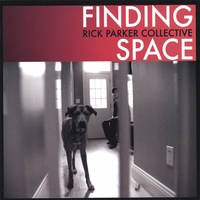Review by Brad Walseth
Rick Parker is young award-winning trombonist and composer currently getting rave reviews for his work on the NYC jazz scene. His second release as bandleader is "Finding Spaces," and the album has been receiving great reviews and acclaim for the young musician's songwriting ability.
"McKibbin" starts things off and sets the tone for the entire recording, with a mid-tempo pace that occasionally shifts into another gear, some moody tonalities, time changes and piano repetition that sometimes grooves. Parker solos pleasantly enough, while guest flugelhornist Maurice Brown brings some intensity. Young up-and-coming saxophonist Xavier cuts loose on a nice up-tempo middle section that is propelled by drummer Kyle Struve. On "Nervous Energy" arpeggiated piano lines played by Sam Barsh (of Avashai Cohen's trio) lead into and bridge various shifts in time and feel. Parker solos nicely, as do Perez, Barsh, and Struve.
"Lost in the Woodshed" follows and takes the energy level down a notch in this moody, halting, somewhat Latin-ish piece that drops a beat every fourth bar. Parker's trombone is beautifully expressive, and bassist Gavin Fallow adds some delicious bowed bass. "Three Steps From Village A" starts out swinging lightly and may provide the most memorable melodic refrain in Parker's contrapuntal interplay with his band members. Perez shows some tasty chops on the soprano sax here, but I find the abrupt breaks - such as Barsh's piano interlude - somewhat tend to diminish whatever momentum the band has achieved to that point. That said, the outro of the song is one of the strongest moments on the record.
Bassist Fallow leads the way into the next piece with a brief solo turn, but "Roots" turns out to be another mid-to-slow tempo song, this time in 7/8 that features an overwhelming sense of foreboding in the arrangement. Parker solos well, as does guest Jaleel Shaw on alto. but drummer Struve again most impresses with his creative playing under Barsh's repeated piano arpeggios - a compositional device that unfortunately tends to grate after a time.
The three-part "Finding Space" is the centerpiece of the album and part one starts off with a driving arrangement that continually changes from straight ahead to broken staggered lines, stops and starts. Parker plays a wonderfully imaginative solo here, as does Brown on trumpet. On this number, the changes work well and point out what a creative composer Parker is. Barsh's quiet solo highlights part two and works in this context and leads into part three's coolly sophisticated, horn-driven outro. Finally, Struve's "Euro Ring" is a compelling end to the recording providing a bit more of a straight ahead groove that is welcome after all the contortions. This song allows the players more room to stretch out: of course the drumming is superb, but Parker and Perez wail as well, while Barsh entertains with some unusual piano directions. The countermelodies Parker and Perez play here are memorable.
All in all, this is an interesting and well-played album from young men I'm sure we will be hearing more of in the future. The arrangements are anything but run of the mill, the horn playing and interplay delicious, and the drummer impressive and exciting. I am interested in hearing what directions Rick Parker and his cohorts takes in their careers.
|

